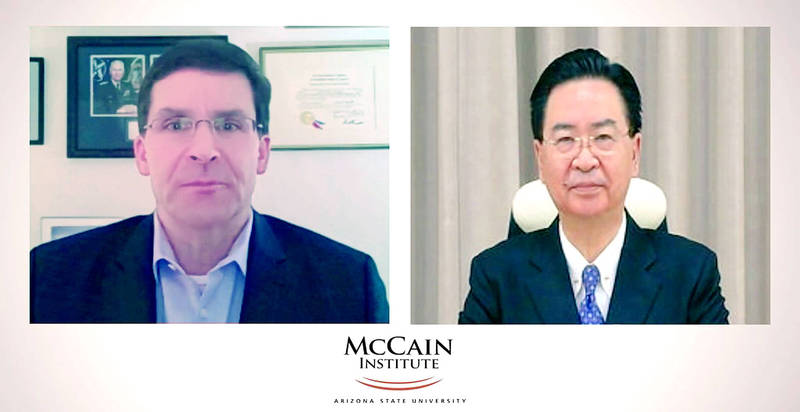《TAIPEI TIMES》 Taiwan not a provocateur, foreign minister says

Minister of Foreign Affairs Joseph Wu, right, and former US secretary of defense Mark Esper participate in a discussion forum organized by the McCain Institute yesterday. Photo: Screen shot from the Internet
/ Staff writer, with CNA
Taiwan will not be a “provocateur” across the Taiwan Strait, but will continue to beef up its defense capabilities to protect its democratic way of life in the event of a Chinese invasion, Minister of Foreign Affairs Joseph Wu (吳釗燮) told former US secretary of defense Mark Esper on Tuesday.
“Taiwan is a peace-loving country, and we want to maintain our stable line of rhetoric in thinking about cross-strait relations,” Wu said during an online appearance with Esper, who served as the head of Pentagon under former US president Donald Trump.
“We don’t want to be a provocateur in a cross-strait conflict,” the minister said.
Tuesday’s talk was part of a series of public conversations between Esper and experts on various issues related to challenges and threats to US national security organized by the Washington-based McCain Institute for International Leadership.
As Esper’s guest in the series’ latest installment, Wu was asked questions on a wide range of issues, many of which focused on Taiwan’s relations with China and how Taipei perceives Beijing’s intentions.
Asked point blank if and when Beijing might invade Taiwan, Wu said that it was not a matter of if, but when, as China has repeatedly threatened to take military action against the country.
“We don’t count on, you know, the calculation of when that will happen, when the Chinese will attack Taiwan, but we are counting on ourselves to be prepared. Whether it’s tomorrow, or next year, or 10 years from now, we will always be prepared,” he said.
To achieve that, Taiwan is increasing its defense budget to boost its asymmetrical warfare capabilities and defensive arsenal, and also develop a civil defense system so that China understands it will have to pay a heavy price if it initiates a conflict against Taiwan, Wu said.
Part of the calculation of any potential conflict between China and Taiwan is whether the US would get involved, and Esper asked Wu about the policy debate in Washington on whether it should show strategic ambiguity or strategic clarity toward Taipei.
Wu said that Taiwan saw no ambiguity in the US’ defense commitment to the country.
“So it doesn’t really matter for Taiwan, what kind of symbol it is, whether clarity or ambiguity, the support is there. And we are seeing more and more support, and that is highly appreciated,” he said.
“There used to be a ‘red team’ [Republicans] or ‘blue team’ [Democrats] in Washington DC, but now it’s all ‘Taiwan team,’” he said.
Asked about his view on the US and other world powers recognizing Beijing over Taipei diplomatically, Wu said that such a policy is fine with Taiwan “even though we don’t like it.”
“And I think under your ‘one China’ policy or the ‘one China’ policy by other major partners of yours, we are still able to engage with each other beneath the level of formal diplomatic recognition,” he said, adding that Taiwan’s relations with these countries have strengthened over the years.
Esper also asked Wu about Taiwan’s bid to join the Comprehensive and Progressive Agreement for Trans-Pacific Partnership, but the foreign minister’s answer focused more on the US’ trade position.
He said he hoped the US would reconsider rejoining the regional trade bloc to jointly guard against the expansion of China’s authoritarianism, and reiterated Taiwan’s hope of signing a free-trade agreement with the US.
In his remarks to open the interview, Esper said the US and Taiwan are long-term friends and partners in the Indo-Pacific region, and have shared history, values and common goals for decades.
The two countries’ ties have been drawn even more closer in recent years amid growing military threats from China, he said.
Esper previously served as the US secretary of the Army and acting secretary of defense before he assumed the role as the head of the Pentagon in July 2019.
He served in that capacity until he was fired abruptly by Trump in November 2020, having been reportedly at odds with Trump over several issues.
He is currently a distinguished fellow at the McCain Institute for International Leadership.
新聞來源:TAIPEI TIMES
















